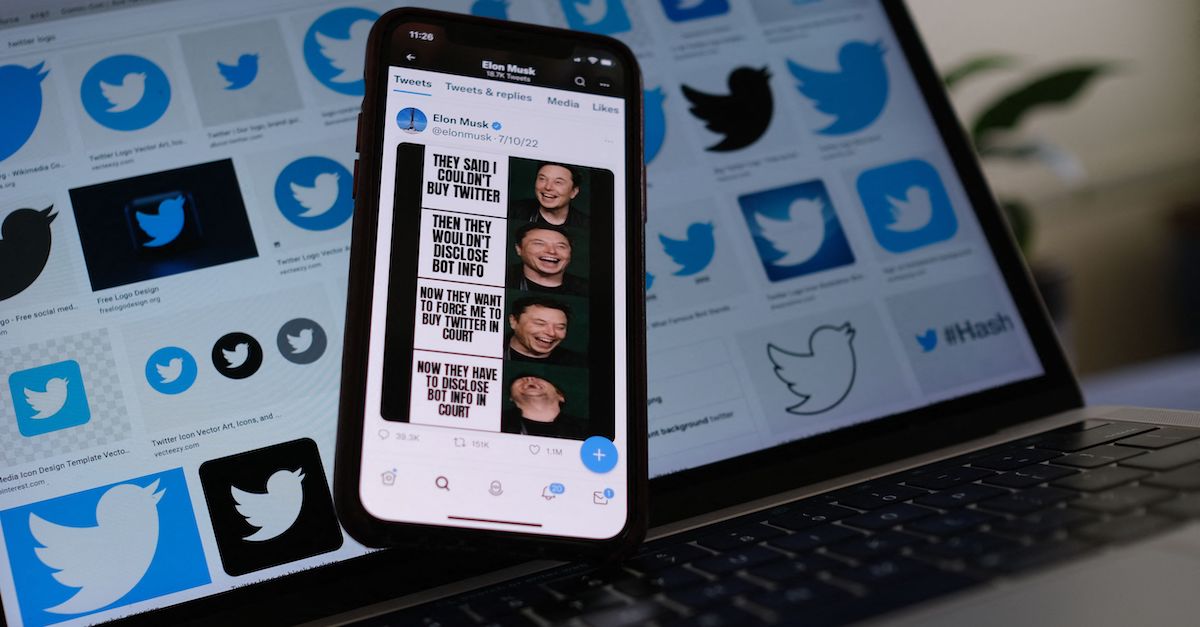
In this illustration photo taken on July 18, 2022, Elon Musk’s Twitter page is displayed on the screen of a smartphone with Twitter logos in the background in Los Angeles.
For more than three hours on Tuesday, attorneys for Twitter and Elon Musk clashed in court over discovery demands, a whistleblower complaint, and whether the postpone the October trial date.
At one point, Twitter’s lawyer asked a Delaware judge to sanction Musk’s counsel for failing to turn over text messages until the company turned up the heat on his legal team.
“We submit that something needs to be done to put defendants on notice that this kind of behavior has to stop,” Twitter’s attorney Bradley Wilson argued.
According to Twitter, the company worried that the sought-after text messages would have been deleted, until the social media giant filed its sanctions motion.
“It turns out that if you tell Mr. Musk that you know he has relevant text messages, and you file a motion for sanctions, you get production of text messages,” Wilson said.
In the rambunctious hours-long hearing, Twitter and Musk’s attorneys traded complaints about the other party’s production of documents. Twitter described the evidence that Musk’s attorneys turned over as “meager,” and Musk’s counsel asked to delay trial to pore over more than 200,000 pages of Twitter’s internal communications over Slack.
“It has been a game of hide and seek,” Musk’s attorney Andrew Rossman, from the firm Skadden Arps, said.
In July, Twitter sued Musk for pulling out of a $44 billion merger deal. Musk has since filed a countersuit against Twitter, accusing the company of fraudulently inflating the company’s value.
The Delaware Court of Chancery is known for its speedy resolution of disputes, and Chancellor Kathaleen S. McCormick upheld that reputation at a hearing held one week after Twitter filed suit, when she fast-tracked a trial for Oct. 17. The fact-gathering process has proceeded with a brisk pace since that time.
On Tuesday, Musk’s attorneys made multiple requests to delay that trial, citing discovery disputes and a recent whistleblower complaint. Rossman claimed that it’s become “blindingly obvious” that the “current schedule no longer works.”
According to Rossman, one of the Slack messages at issue said: “Let’s stop lying to ourselves. We lie to ourselves a lot,” but other responses in the chain were shielded by redactions.
Twitter’s counsel estimated that there are 200,000 pages of Slack messages at issue.
Wilson bristled at the notion that the company “took a breath” on their discovery obligations.
“To accomplish this unprecedented data pull, there have been folks at Twitter working around the clock,” Wilson said.
Telling the judge that Musk keeps sending late-breaking discovery demands on the cusp on the deadline, Wilson added: “At some point, your honor, this needs to stop.”
Twitter also downplayed the whistleblower complaint filed by its former security head Peiter “Mudge” Zatko, echoing many of Musk’s claims that the company low-balled the percentage of accounts that are spam.
“Peter Zatko was not in charge of spam at Twitter, full stop,” Wilson said.
The Washington Post profiled Zatko in late August, and Musk’s counsel cited the exposé in service of their motion to amend their complaint, saying that any harm to this case would come from Twitter “hiding” information about him.
“They should have told us,” Musk’s attorney said, referring to the whistleblower’s allegations. “They should have told the court, and they should have told the public.”
Twitter’s attorney William Savitt characterized the bid to amend their claims as another “delay” tactic, pointing to a communication he attributed to Musk.
“It won’t make sense to buy Twitter if we’re sliding into World War III,” Musk allegedly wrote.
For Savitt, the message gave up the game.
“This post-signing inquisition of Twitter isn’t due diligence,” the Twitter attorney said, urging the judge to reject Musk’s bid to “run out the clock.”
Savitt called the whistleblower complaint as the “unsubstantiated allegations” by a “disgruntled” ex-Twitter employee, who tailored “deeply suspect” claims around their adversary’s case.
The judge adjourned the proceedings without a ruling.
(Photo by CHRIS DELMAS/AFP via Getty Images)